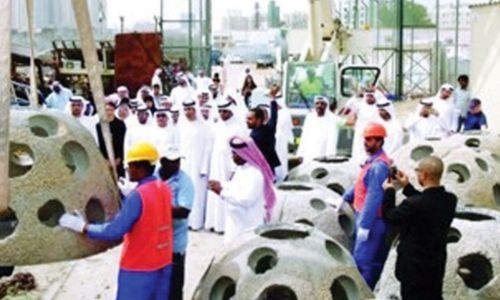The Supreme Council for the Environment (SCE) in Bahrain has cautiously approved plans to build artificial reefs off the country’s coastline in order to boost fish stocks and reduce fishing costs. The council expressed its support for the North Municipal Council’s proposal, stating that it aligns with efforts to safeguard the marine ecosystem and contribute to the sustainability of Bahrain’s natural biodiversity. The SCE has called for a feasibility study to be conducted and expressed a preference for using concrete materials for the construction of the reefs over earthenware.
The Northern Municipal Council initially approved the proposal in March and recommended installing artificial clay reefs within Bahraini waters to help reduce operational costs for local fishermen. The council believes that the artificial reefs could increase fish stocks in the area and shorten the distances that fishermen need to travel, thereby easing the financial burden of their trips. The artificial reefs would also provide a breeding ground for various fish species and offer a refuge for marine life to thrive.
While the SCE supports the concept of building artificial reefs, they have emphasized the importance of conducting a comprehensive study to assess the economic viability of the project. The council believes that factors such as cost-effectiveness and available alternatives for reef construction, such as using concrete materials, should be carefully considered. The SCE pointed out that concrete reefs have been extensively tested and proven to be more reliable due to their durability and longevity, whereas earthenware reefs have been used sparingly and primarily for experimental purposes.
The SCE’s cautious approval of the artificial reef project reflects their commitment to preserving Bahrain’s marine ecosystem and promoting the sustainable use of natural resources. By supporting initiatives that aim to boost fish stocks and reduce fishing costs, the council is working towards achieving the Kingdom’s strategic objectives related to environmental conservation and biodiversity protection. The construction of artificial reefs could potentially benefit local fishermen by providing them with a closer and more productive fishing ground, thereby lowering fish prices in local markets.
In conclusion, the Supreme Council for the Environment’s endorsement of plans to build artificial reefs in Bahrain represents a significant step towards enhancing the country’s marine environment and supporting the fishing industry. The council’s call for a feasibility study and preference for using concrete materials underscore the importance of conducting thorough research and selecting the most suitable construction methods for the project. By working together with local authorities and stakeholders, the SCE is paving the way for sustainable development and conservation efforts in Bahrain’s coastal waters.































